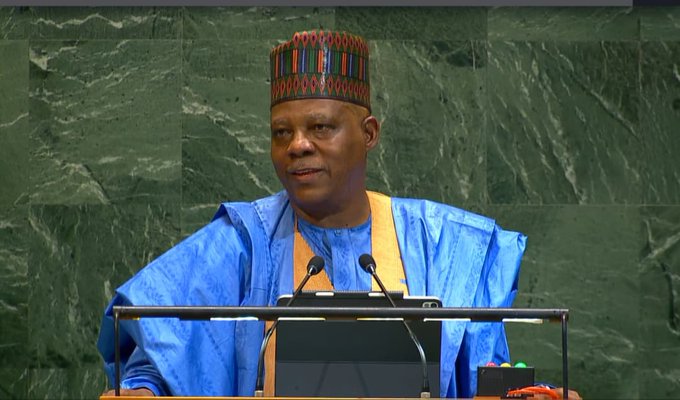President Bola Tinubu, represented by Vice President Kashim Shettima, has delivered a strong message to world leaders at the 80th session of the United Nations General Assembly (UNGA80).
He warned that the global body must undergo significant reforms or face becoming irrelevant in a world where major events are increasingly bypassing its influence.
The President’s address delivered yesterday was critical of the UN’s perceived inaction, citing ongoing conflicts and human suffering, particularly in the Middle East, as “stains on our collective humanity.”
READ ALSO: Tinubu honours Ogoni four, pledges revival of Ogoniland
He stated that the organisation’s credibility is undermined by a gap between its “careful diplomatic language” and actual deeds.
Tinubu outlined four key areas for reform, beginning with a direct call for a permanent seat for Nigeria on the UN Security Council.
“Nigeria must have a permanent seat at the UN Security Council,” he stated. “The United Nations will recover its relevance only when it reflects the world as it is, not as it was.”
He positioned Nigeria as a transforming nation, growing from a colony of 20 million to a sovereign country of over 236 million people.
In the Middle East, Tinubu took a firm stance on the Israeli-Palestinian conflict, declaring that “a two-state solution remains the most dignified path to lasting peace for the people of Palestine.”
He emphasised that Palestinians are human beings “equal in worth, entitled to the same freedoms and dignities that the rest of us take for granted.”
Tinubu also proposed radical reforms to the global financial system, calling for a new mechanism to manage sovereign debt, which he likened to an “International Court of Justice for money.”
This new system would help developing nations escape the economic constraints of being primary exporters of unprocessed goods. He stressed that debt relief is not a charitable but a necessary step for global peace and prosperity.
The President positioned Africa’s natural resources as vital for global stability, calling for fair investment and local processing of strategic minerals found on the continent. He emphasised that when countries export raw materials without fair benefits, it only leads to tension and instability.
Addressing Nigeria’s economic situation, Tinubu acknowledged the challenges faced by his citizens but defended his government’s “difficult but necessary steps” to restructure the economy.
He explained that reforms, such as removing subsidies and currency controls, were undertaken to benefit the majority rather than a select few.
READ ALSO: Legal expert slams Rivers assembly’s ₦254bn probe, as Tinubu hosts Ibas, EFCC chairman
On the fight against terrorism, the President stated that long-term victory lies in winning the battle of “values and ideas” rather than through military conquest alone.
He reaffirmed Nigeria’s unwavering commitment to multilateralism, peace, and human rights, warning that if the UN fails to make real change, its path toward irrelevance is “already predictable.”



